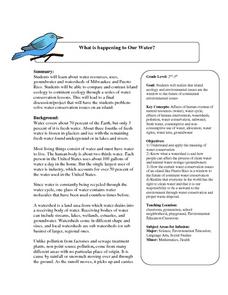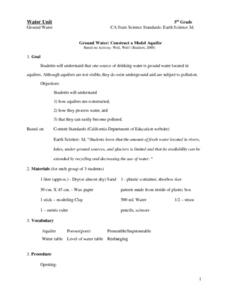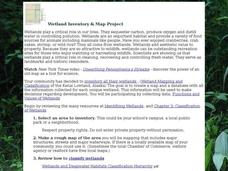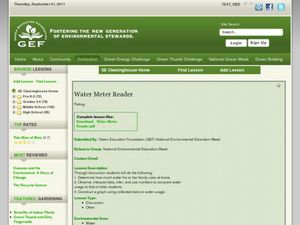Curated OER
WHO Wants Clean Water! Do You? Solving Conflicts Over International Water Rights Issues
Students examine the water rights on an international scale. In this social studies lesson, students research on a specific water rights issue. They write a paper about their findings and create a PowerPoint presentation which they share...
Curated OER
What is Happening to Our Water?
Learners compare and contrast Wisconsin's water resources to that of Puerto Rico. They research books about islands, particularly the Puerto Rican islands. Student view illustrations of island ecology. They discuss the illustrations and...
Curated OER
Hatching Brine Shrimp
Students experiment with temperature and salinity to detect favorable environments for hatching brine shrimp eggs. They make some predictions about which environments will yield the most hatched brine shrimp and record the number of...
Curated OER
BIOASSESSMENT OF STREAMS
Students work as a team to gather organisms from a stream to evaluate if the water quality is excellent, good, or fair to poor.
Curated OER
Antarctica
Students explore why Antarctica is so important to the planet. They investigate the physical characteristics. Students create their own unique treaty of governance for Antarctica and discuss how laws are enforced in Antarctica.
Curated OER
Snapshot Day Definitions & Activities
In this watershed worksheet, students read through related definitions and complete 17 short answer questions about deposition and erosion in the Hudson River.
Curated OER
Ground Water: Construct a Model Aquifer
Students recognize that one source of drinking water is ground water located in aquifers. They create a model of an aquifer and summarize their experience in a report.
Curated OER
Don't Trash the Earth
Students experience a hands-on environmental science project. They access about recycling as they collect data on their own family's trash production. Students analyze the data with worksheets, chart the data, and present their findings.
Curated OER
Renewable vs. Non-Renewable Resources
Fifth graders identify renewable vs. non-renewable resources and comprehend why conservation of resources is important. They are asked what they think the words natural and resource mean. Pupils then put the words together to define...
Curated OER
Wetland in a Pan
Students examine wetlands and what the effects of destroying them will do. In this wetland instructional activity students relate the importance of wetland functions to their own needs.
Curated OER
Adaptations-What a Concept
Students study the pink river dolphin and how it has adapted to its environment. In this adaptations lesson students construct a map that represents certain relationships.
Curated OER
Wetland Inventory and Map Project
In this wetlands inventory and map project learning exercise, students do research on the wetlands and complete a map project about it. Students follow 6 sets of directions with Internet links.
Curated OER
Human Impact on the Environment
In this environmental science instructional activity, students complete a crossword puzzle with 26 questions about human impact on the environment.
Curated OER
Pond Ecosystem Field Trip
Students investigate the environment by participating in a class trip. In this pond ecosystem lesson, students define a list of vocabulary terms associated with ponds such as invertebrate and metamorphosis. Students attend a field trip...
Curated OER
Relating Number of Insect Species to Water Quality
Students are asked to respond to questions such as:" Have there been surveys of the area to inventory the species?" (For example, for a wetland area, do they know what amphibians live there and how abundant they are?) Are there any...
Curated OER
Water Systems
In this water systems worksheet, students refer to their textbook to complete questions about the amount of water on earth and the portion of water in various forms. Students review porosity, permeability, and water table. This worksheet...
Curated OER
Snow vs. Water
Young scholars fill three cups with snow. They record the height of snow in each cup, and allow the snow to melt. Students measure the height of the water in each glass or cup, and record their results on the worksheet. They answer...
Curated OER
Water Quality
Students are presented with a hypothetical situation to investigate the water quality of the James River. They are given data to analyze and put into the graphic organizer that is included to help solve the problem. The instructional...
Curated OER
Water Quality Monitoring
Students comprehend the four parameters of water quality. They perform tests for salinity, dissolved oxygen, pH and clarity or turbidity. Students comprehend why scientists and environmental managers monitor water uality and aquatic...
Curated OER
The Romans: Public Health and Water
In this Ancient Rome worksheet, students read about the public health system of Ancient Rome: aqueducts, public baths and sewers.
Curated OER
Investigation of the Aral and Salton Seas
Students become more environmentally conscious. They see that it may be too late to "save" the Aral Sea, but there is still hope to prevent the ecological collapse of the Salton Sea.
Curated OER
Watershed Awareness
Learners investigate the relationship between upstream influences in their watershed and the watershed's estuary. They apply the scientific process to test a hypothesis while examining the impact of upland activities on estuaries.
Curated OER
Water Meter Reader
Students examine a water bill from their household and examine it to find out how much water is used each month. They read their home water meters at the same time of the day for seven days and then construct a graph using their data.
Curated OER
Missing Macroinvertebrates
Students investigate the concept of a macroinvertebrate. They observe the presence of increases or decreases in population in order to test for factors that contribute to the extinction of a species. Students predict the likelihood of...

























